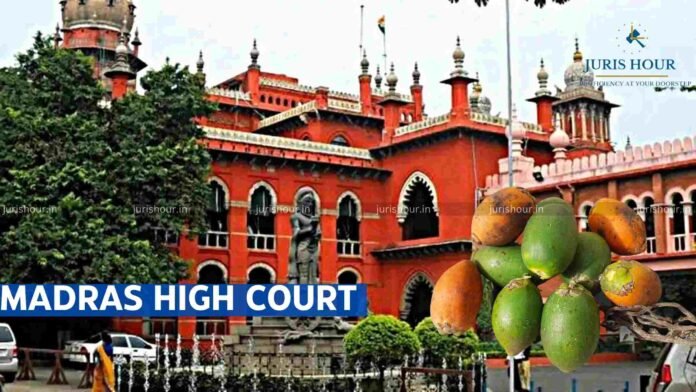The Madras High Court has directed the provisional release of 17 consignments of roasted areca nuts imported by M/s. Unik Traders, after holding that the goods cannot be treated as prohibited items in view of the stay on the Central Government’s April 2025 import restriction notification.
The bench of Justice N. Anand Venkatesh, while disposing of the writ petition filed under Article 226 of the Constitution, held that since the moisture content of the imported nuts was below 10%, they must be treated as roasted areca nuts, in line with earlier rulings of the Madras High Court’s Division Bench and the Supreme Court’s affirmation.
The petitioner/assessee, Unik Traders had filed 19 Bills of Entry for clearance of roasted areca nuts. Customs authorities at Chennai refused to release the consignments, citing alleged misdeclaration—claiming that raw areca nuts were being imported under the guise of roasted ones to evade Minimum Import Price (MIP) restrictions and customs duties.
The importer contended that the goods were duly tested and certified as roasted areca nuts by the Food Safety and Standards Authority of India (FSSAI), and that the Customs Department’s decision to send the samples for retesting to the Central Revenues Control Laboratory (CRCL) was arbitrary and contrary to law.
The petitioner argued that the FSSAI’s referral laboratory report confirming the goods as roasted areca nuts is final and binding under Section 46(4) of the Food Safety and Standards Act, 2006. The Customs Department cannot seek a second test without the importer’s request, as per Regulations 9(9) and 9(10) of the Food Safety and Standards (Import) Regulations, 2017. Earlier, the Division Bench of the Madras High Court (in Commissioner of Customs v. Universal Impex) and the Supreme Court had ruled that moisture content below 10% indicates roasted areca nuts and not raw ones. The Finance Ministry’s circular dated August 1, 2025 also recognized this classification norm.
The department contended that the petition was premature, as an investigation into misdeclaration was pending. The FSSAI certification merely determines edibility and not trade classification. A new notification dated April 2, 2025 prohibited import of even roasted areca nuts below a CIF value of ₹351 per kg, making such consignments prohibited goods.
The Customs Department claimed that retesting by the CRCL revealed that most consignments did not qualify as roasted areca nuts.
Justice Venkatesh examined the CRCL’s reports and found that in almost all consignments (except two), the moisture content was below 10%, clearly bringing them within the definition of roasted areca nuts as per binding precedents.
Quoting the Division Bench ruling in W.A. Nos. 3647 & 3648 of 2024 (confirmed by the Supreme Court in SLP (C) Nos. 17655 & 17656 of 2025), the Court reiterated, “if the moisture content is between 10% and 15%, it is a raw areca nut; anything below 10% is a roasted areca nut.”
The judge also relied on the Allahabad High Court’s Division Bench judgment in Rawder Petroleum Pvt. Ltd. v. Union of India (2025), which held that the Customs Department cannot retest samples without the importer’s request, and that FSSAI’s first report should prevail.
The Court observed that the April 2, 2025 Notification, imposing MIP restrictions on roasted areca nut imports, has been stayed by a Division Bench of the High Court, and hence cannot be enforced at present. Therefore, the seized consignments cannot be treated as prohibited goods.
While recognizing the perishable nature of the goods, the Court directed Customs to release 17 consignments (excluding two rejected ones) subject to the various conditions.
Firstly, payment of declared duty by the petitioner on the 17 consignments.
Secondly, execution of a bond for the differential duty amount of ₹2,24,33,60,198/- as estimated by Customs.
Thirdly, customs shall release the goods within seven days of compliance.
Fourthly, the release shall be provisional, subject to final adjudication.
Lastly, the importer cannot later use the provisional release to avoid payment of any future differential duty or penalty.
Case Details
Case Title: M/s.Unik Traders Versus The Commissioner of Customs
Case No.: Writ Petition No.36557 of 2025
Date: 14.10.2025
Counsel For Petitioner: Vijay Narayan
Counsel For Respondent: AR.L.Sundaresan
Read More: Madras HC Quashes Customs Public Notice Restricting GST Collection by CFS For Auctioned Cargo

